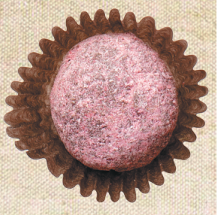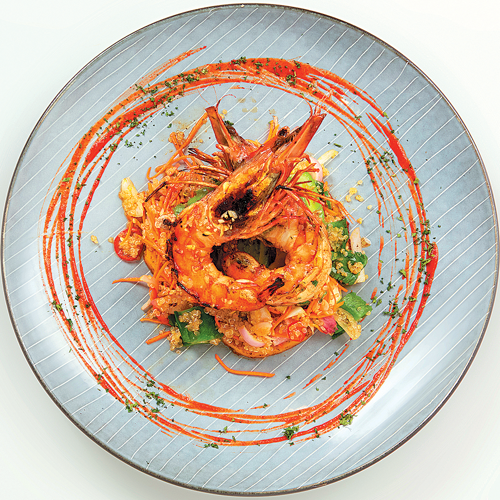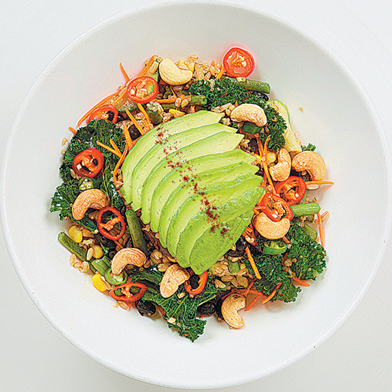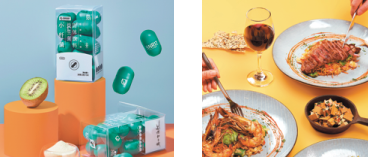GROWING APPETITES DEVELOP FOR HEALTHY EATING

More diners saying no to sugar and heading for the gym
Xu Ping, a freelance worker in the investment industry in Beijing, used to love eating desserts, but since she started to exercise regularly five years ago, she has steered well clear of these sweet temptations.
However, when she recently discovered a new raw-chocolate product that contains no granulated sugar, she decided to use it as a food supplement after her daily workout session.
"The flavor of the chocolate is so good, it melts in my mouth and it won't make me gain weight," Xu said, adding that when she buys processed food, she always checks the nutrition information first.
"There are now more varieties of low-fat and low-sugar snacks and desserts for me to choose from," the 52-year-old said. "I used to have some protein bars after running, but they are not as tasty as the chocolate."
The fat and sugar content in processed food has become a key factor for Chinese customers, who have placed more emphasis on a healthy diet, especially since the pandemic emerged. The variety of healthy snacks, meal replacements and functional food products on the domestic market has risen fast.
Functional foods claim to have an additional purpose, often related to health promotion or disease prevention, by adding new ingredients or more of those that already exist.
According to a report on fitness and weight loss issued by the JD Big Data Research Institute, the number of searches for "lose weight" and "fat loss" on all JD platforms reached about 10 million in March, while those for "low sugar" rose tenfold year-on-year.
Dong Fei, senior researcher at the institute, instigated the research when she noticed the growing number of searches after Spring Festival. She said data for the report were collected from customers among JD's 400 million users who searched and ordered such products
"Customers are losing weight cost-effectively, and they like to precisely control the number of calories they eat, which they lose by exercising," she said.
The report divides those who want to lose weight into three categories according to their needs: low caloric intake; more exercise; and balanced nutrition.
"Young people prefer to do more exercise. For the low caloric intake group, many of these people are customers who have families and kids and don't have much time for exercise," Dong said.
The report found that sales of low-calorie fast food rose by 432 percent compared with February, while the growth rate for low-sugar cereal products and low-sugar coffee and milk tea was 222 percent and 100 percent respectively.
Dong said low-sugar yogurt was in high demand in March, with sales of chia seed yogurt and probiotic yogurt, which aid digestion, rising month-on-month by 597 percent and 139 percent respectively.
She added that different age groups have contrasting preferences when buying healthy and functional foods. The post-1975 generation prefers dark chocolate; the post-1985 age group likes low-fat or skimmed milk and oolong tea; while the post-1995 generation prefers low-sugar coffee and milk tea.
"Male customers like to drink oolong tea and eat dietary fiber. Female consumers prefer low-calorie drinks and probiotics (microorganisms introduced into the body for their beneficial qualities)," Dong said, adding that running and yoga are the most popular sports for each gender.
Sales of nutritional products, including probiotics, proteins and enzymes, have risen significantly, along with those for products that help relieve fatigue.
In addition to rising search numbers among customers for healthy food, Dong said food companies have launched new products as a result of growing demand.
This trend is being seen online and offline. Alibaba-owned grocery retail chain Freshippo recently launched numerous low-fat, low-sugar and low-calorie products, including low-fat ham, low-fat milk and quinoa chicken sandwiches.
Yu Chaoqi, a purchasing head at Freshippo, said that in the past two months sales of low-fat, low-sugar and low-calorie food have risen significantly compared with previous years. With summer arriving, low-sugar drinks are in demand, with Chinese brand Genki Forest the most popular, he said.
"Zero-calorie granulated sugar chocolate products have sold well since they were put on the shelves, especially the ChocZero and Chocday brands," Yu said.
"Our clients are the new middle class who pursue high-quality lifestyles, and even though some products are labeled 'low sugar', they will check the nutrition information to verify this," Yu said.
Natural ingredients
The chocolate that Xu, the investment freelancer, adores is made by Bengtang, a new brand founded last year by Li Kun-hsing, a doctor who graduated from Shandong University of Traditional Chinese medicine.
During studies for his doctorate, Li noticed in his research that cancer is directly or indirectly related to sugar. When he returned to his hometown in Taiwan in 2010, he started to develop food that contained no granulated sugar.
After the pandemic emerged, the 44-year-old set out to launch a brand for domestic and overseas customers that did not contain granulated sugar.
"We named our brand Bengtang, because in Chinese this literally means 'no use of sugar'," he said.
Li aims to use natural ingredients in his chocolate product, instead of raw materials sourced from chemicals, by looking to compound prebiotics extracted from plants such as corn and seaweed to replace granulated sugar.
"Prebiotics are part of a natural sugar substitute ... They have different characters-some can withstand high temperatures, while others can't, so our goal is to find the most appropriate proportion for each," he said.
Li added that a research and development group visited many countries to learn about making chocolate. The team found a recipe to make chocolate with an especially smooth taste-the solution being to solidify it at a temperature of 5 C.
"We have been inspired by the methods used to make premium whisky and wine," Li said.
The first Bengtang branch in Beijing opened in May in the Wangfujing area and there are also three stores in Shanghai. In addition to chocolate, the outlets sell coffee and ice cream.
"We don't offer sugar to our clients who order coffee, as we want them to taste the original flavor of the coffee beans, which we roast ourselves," Li said. "Even when customers order takeaway coffee and want to add sugar, we suggest they add a sugar substitute."
Li said price for the brand's chocolate products are above average (about $21 for a 110-gram box) as natural extracts are used, which have high research and development costs. "We believe that an increasing number of customers are willing to pay for a healthy lifestyle," he said.
"People born since 1990 are placing more emphasis on 'anti-aging', so they go to the gym, take cosmetic medicine and eat less sugar content in their daily diet," Li said.
According to a report on the market and prospects for China's fitness and weight-loss sector issued by an industry research institute last year, the market size in the second half of 2019 for functional food aimed at weight loss reached about 194.5 billion yuan ($30.28 billion) and will rise by more than 402 billion yuan by 2023.
Sun Gonghe, director of the China Chain Store & Franchise Association, said that since the onset of the pandemic, consumers have focused more on healthy eating.
Zhang Yimeng, founder of low-sugar bread chain Guaishoubuyanshi, said customers' requirements for bread and desserts have become more diverse.
"In the past, clients only wanted their food to be tasty, but now they need it to be both healthy and attractive. It's even better if food provides nourishment, so they always check related information when buying processed items," she said.
New approach
Anna Lin Yip, marketing director at Moka Bros Group, a healthy eating restaurant chain in Beijing, Shanghai and Chengdu, capital of Sichuan province, said customers used to want to know the number of calories in each dish before they ordered, but now they realize that what really matters is a healthy diet.
She said clients used to view dining at Moka Bros as a "special" part of their slimming regimen, but now they consider the experience contributes to enjoying "proper" meals. "It's more like saying 'I have time and money to invest in my health and myself'," she said.
Lin added that in recent years the proportion of customers at the group's restaurants has shifted to about 90 percent Chinese from around 60 percent of foreigners. More families are visiting its eateries.
Moka Bros is adding plant-based meat to menus, and oat milk is already a choice for its coffee options, Lin said-not just for vegan customers, but to provide an alternative for all its clientele.
Boohee, one of the most popular healthy food product brands in China, launched in 2008 as a website providing information about nutritional content.
Wang Cong, product director, said the site's users are mainly female white-collar workers age 18 to 35 living in first- and second-tier cities.
Customers' demands for healthy snacks and functional food have continued to rise in the past two years, with the pandemic accelerating this trend, she said.
"Customers buying snacks are nearly all younger than those buying functional food. The former are mostly looking for snack alternatives, which make them feel less guilty when eating, while there is more demand among the latter for the effect of the product they are buying," she said.
In 2018, Boohee launched a 21-day challenge meal set, and a year later it released a three-day meal set. Demand has been high for both. Each day's meals are packaged in a single bag and include sufficient nutrition, but they have 500 fewer kilocalories (a unit of energy equal to 1,000 calories) than a person's average daily consumption, Wang said.
For example, a typical bag includes coffee protein drinks and chia seed oatmeal for breakfast, beef noodles and a slice of chicken breast for lunch, a chia seed soda biscuit and chicken pad for dinner, plus a cocoa-flavored protein bar as an extra.
"We recommend this set for people who want to lose weight, and we also suggest they eat some fresh fruit and vegetables," Wang said.
She added that the brand has a 20-strong research and development team plus researchers from suppliers to advance its products. Some of the snacks in the meal set have been turned into single offerings after positive feedback from customers.
Wang said the three-day meal set is updated every three months, with some of the changes based on such feedback.
"Unlike some snack products, which are available for a long time, we renew our products pretty quickly," she said.
Many low-fat and low-sugar snack brands have emerged in the past two years, but for Wang, they are not Boohee's competitors. "We are all competing with snacks that are not healthy, and we hope that Chinese customers can develop the habit of healthy eating," she said.
liyingxue@chinadaily.com.cn





























